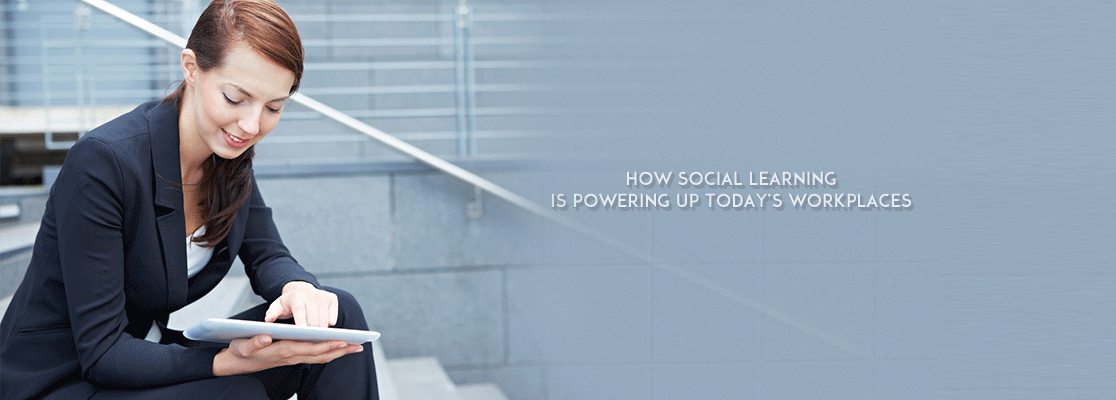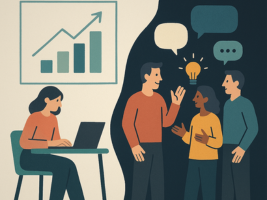THE QUOTE
“Learning would be exceedingly laborious, not to mention hazardous, if people had to rely solely on the effects of their own actions to inform them what to do. Fortunately, most human behaviour is learned observationally through modelling; from observing others one forms an idea of how new behaviours are performed, and on later occasions this coded information serves as a guide for action.” – Albert Bandura (Originator of Social Learning Theory)
“The research isn’t heartening. We’re still seeing an avoidance of social learning, the continual use of courses as the only solution, and consequently organizations that can’t adapt fast enough.” – Clark Quinn
THE JOURNEY
We, at Learnnovators, have always been fascinated by the enormous power of social learning, and have been following up researches and discussions by experts around this subject closely for some time now. We also have been “learning-out-loud” and “working-out-loud”, thereby trying our best to practice this form of learning.
So today, as we jumped into the social learning bandwagon, experimenting with and practising this learning form internally in our organization, it was but natural for us to recall Clark’s concern and to connect with our own questions on the subject. To get more insights on this, we embarked on a quick exploratory journey to seek out the answers.
Some of the questions we had in mind were:
- What benefits does social learning offer to workplaces of today? What are the trends? What are some of the success stories?
- What kind of concerns do organizations face while implementing social learning? What are some of the interesting ways in which they are addressing these challenges? What best practices can be drawn from these experiences to benefit others?
- How will social learning evolve in the coming years? What does its future look like?
OUR FINDINGS
We were able to find, review, and curate some valuable resources that, we thought, could be of interest to you too. Here they are:
Quotes
- “Social tools leave a digital audit trail, documenting our learning journey—often an unfolding story—and leaving a path for others to follow.” ― Marcia Conner
- “In a world of rapid change, we each need to garner as much useful information as possible, sort through it in a way that meets our unique circumstances, calibrate it with what we already know, and re-circulate it with others who share our goals.” ― Marcia Conner
- “Social learning has always been part of being human, but social media also isn’t a cure-all remedy.” – Clark Quinn
- “In order to be successful in social learning, organisations need to practice ‘Walk the Social Talk’.” – Jane Hart
- “As more learning designers become aware of the latest research, through their Personal Learning Networks, it will eventually take hold. The industry and our clients move slowly. We just have to keep pushing for positive change and celebrate the small victories.”– Connie Malamed (in our interview with her)
- “The numbers (in the 70:20:10 Model) are not a rigid formula. They simply remind us that the majority of learning and development comes through experiential and social learning in the workplace (the ‘70’ and ‘20’) rather than through formal classes and courses (the ‘10’).” – Charles Jennings (in our interviewwith him)
- “To succeed in social media you have to have strong social skills by nature.” – Connie Malamed (in ourinterview with her)
- “With the rise and rise of social media, it’s almost inevitable that the ‘20’ will become more important as a channel for learning.” – Charles Jennings (in our interview with him)
- “Today’s organizations are moving towards on-the-go, collaborative social learning, which is where learning is headed, and I think that the future holds more student-centric learning and reality-based education.” – Christopher Pappas (in our interview with him)
- “Through 2015, 80% of social business efforts will not achieve the intended benefits due to inadequate leadership and over emphasis on technology.” – Gartner
Articles
- Techcrunch Study: Many senior executives like to talk the social media talk. But only 10% walk the social talk! Just one in 10 CIOs from Fortune 250 companies actively use public social networks. Within that group, more than one-third either do not have a LinkedIn profile, or have fewer than 100 connections.
- Top 9 Competencies of an Informal/Social Learning Designer: This is our post on the top 9 competencies that an informal/social learning designer needs to possess for actively engaging in the design and development of social learning activities.
- The 70:20:10 L&D Model for Developing a High-Performing Workforce: This is our article on the 70:20:10 model or framework for learning and development in which we present our views on the strategies to prepare your organization for the 70:20:10 L&D framework, with links to some of the most interesting and brilliant resources on the web that we’ve curated for the community on the subject.
- Social Media is not Social Learning: In this article, Dan Pontefract elaborates why social media is NOT social learning, and also points out the significance for organizations to define and support social learning at their workplaces.
- Dan Pontefract on Social Learning: This is a short interview that SkillSoft conducted with Dan Pontefract in which he shares some brilliant insights on the benefits related to employee engagement to organizations offering social learning to its workforce in his own style using facts and metaphors. He also briefly touches upon the disadvantages that organizations with traditional mindset suffer that do not offer this form of learning for their employees.
- 5 Steps To Use LinkedIn For Social Learning: In this article, Christopher Pappas explores some of the ways to leverage the power of social learning using the features offered by LinkedIn in our eLearning programs. Also included are references to a few valuable resources on the subject of social learning.
- Social Learning Fear Factor: This interesting ATD article by Allison Michels, Andrea Lodato, and Carol Runyan discusses the role of L&D practitioners in social learning and the steps they need to take in order to move past the ‘fear’ of social learning.
- How to Reduce the Social “Risks” in Online Training: This is an article by Gauri Reyes that takes a look at some interesting ways to entice online learners to participate in social learning activities.
- 5 principles for a successful formal online social learning experience – and it’s not about the tools: This post by Jane Hart lists five key principles involved in a formal social learning experience, which she calls a ‘semi-organised social learning experience’ useful as a stepping stone for organizations which find it challenging to embrace social learning in one go.
- 28 eLearning Tips for Social Learning: This article by Christopher Pappas lists many tips to effectively use social media in formal learning programs. It also includes some interesting tips for using Facebook and Twitter effectively in formal programs.
- L&Ds Business Is Not In Driving Social Business: In this post, Mark Britz expresses his views on why L&D shouldn’t be exclusively in charge of organizational efforts to help people build social networks and personal knowledge management skills.
- 8 Top Tips to Create an Effective Social Learning Strategy: This post by Christopher Pappas discusses how e-learning professionals can take advantage of the opportunities that social learning offers. He also provides his advice on the elements that need to be included while developing a social learning strategy.
- How to Build and Moderate a Thriving Social Learning Community: Part 1 – Forming: This post by Julian Stodd (Founder and Co-captain of SeaSalt Learning) is part of a series of articles aimed at exploring elements around the core models of formation, growth and management of social learning communities. This post, which is the first one in the series, discusses the stages in the formation of a social learning community.
- Why ‘LinkedIn at Work’ Would Be Much More Interesting Than ‘Facebook at Work’: While most companies are setting up enterprise social networks or atleast getting started thinking on these lines, social media majors such as Facebook and LinkedIn have declared plans to enter the enterprise social network market. This article discusses why LinkedIn is in a better position to invoke interest among enterprises.
Stories
- How We Use Social Media For Informal Learning: This blog post, by Steven Boller of Bottom-Line Performance, discusses about #TalkTech – a 30 minute chat they hold once a week on Twitter – an interesting activity that helps his company successfully practice informal learning with the effective use of social media.
- A Special Social Learning Experience In India: This story by Jane Hart is about the experiences she had while running an online social workshop for the Sales Team at Pfizer India. Also included are feedbacks on the approach and the program from some of the participants.
- Supporting Social Learning in the Organisation: This post by Jane Hart contains some brilliant insights on the role of L&D in social learning (in the form of tweets and links that were shared by her) from a recent Twitter chat (#exploresocial) in which she participated.
- Power to the Learners: An interesting read! The experiences of people who attended EDUC 689 – an informal course on ‘Designing for Informal Learning’ – before, during, and after the class in the form of 140-character tweets that they shared with the readers of eLearn Magazine.
- Social Learning Examples in the Workplace: This article provides a quick overview of some of the most interesting examples of how organizations are using social media for social learning at their workplaces (also includes links to original case studies).
Videos / Presentations
- Social Learning Theory Video: This is a quick video that depicts the essence of social learning in a fun way.
- Social Learning Theory Video: This is another video that carries two good examples of social learning.
- Social Learning In The Workplace: This is a brilliant presentation by Jane Hart that explores the following questions:
- What is social learning?
- What social learning takes place in the workplace?
- How can L&D support social learning?
- How Can L&D Professionals Support Social Learning?: This quick, short excerpt of an interview that Charity Learning had with Harold Jarche highlights the key take-aways on how L&D professionals can support social learning at workplaces.
- Social Learning at TELUS: In this talk, Dan Pontefract (Director of Learning and Collaboration at TELUS) explains how he promotes learning and development through social media in his organization using a bunch of custom-made tools that mimic some of the most popular social media tools capitalizing today’s market.
- 12 Steps To Successful Social Learning at Work: This is the recording of an interactive session by Jane Hart that provides a clear framework for supporting social collaboration in the enterprise. The concepts illustrated by a wide range of case studies are greatly engrossing.
- The Power of Social Learning: This is a video (by ProfitAbility Learning and Development Services LLP) that depicts a discussion by Brian Helweg Larsen (ProfitAbility) and Ben Betts (HT2) on the role of social learning for modern business in the form of an interesting white-board-animation.
- Social Media and Social Learning for Learning Professionals: In this presentation, David Kelly argues that, it is not social media or social learning but “convergence” that is the “new” factor. He also discusses the advantages and usages of some of the most powerful social media tools in the context of social learning using many interesting examples.
- From Training, To Performance, To Social: In this talk, Harold Jarche discusses strategies for incorporating performance support and social learning to improve workplace performance. The narrative style of his depiction of the history and evolution of training and workplace performance support that extends to today’s social learning trend adds immense value to this presentation.
Interviews
- Expert interview – Ryan Tracey on Social Learning: In this interview, Ryan Tracey (E-Learning Manager, AMP Australia) shares his insights about social learning. He touches upon the significance and the challenges that this form of learning is facing today. His thoughts on the role of L&D professionals in the realm of social learning are both interesting and thought-provoking.
- Trends In Social Learning: Interview with Tony Sheehan: This interview with Tony Sheehan (Associate Dean, Digital Learning at London Business School) offers brilliant insights into the relevance of social learning in the workplace. Also interesting are his simple suggestions for organizations to encourage social learning.
- Expert Interview – Con Sotidis on Social Learning: This is another interview by Totara with Con Sotidis (Founder of Ozlearn) in which he shares his insights on what works and what doesn’t in social learning. He also shares his advice on the strategies that organizations need to adopt in order to address the key challenges this form of learning poses.
- Charles Jennings Crystal Balling with Learnnovators: This is our interview with Charles Jennings (Founder, The 70:20:10 Forum) in which he shares his brilliant insights on the significance of informal and social learning in workplaces.
Books
- Social Learning Handbook 2014: This book authored by Jane Hart that has gained immense popularity in the L&D world, explores the true meaning of social learning inside today’s organizations. It takes a look at the new roles for HR, OD, and L&D departments, and suggests key ways to support social learning at workplaces, and serves the purpose of an excellent guidebook with the kind of case studies, checklists, and the curated set of resources included for additional reference.
- Exploring the World of Social Learning: In this book, Julian Stodd, through a compilation of his own blog posts augmented with additional commentaries, explores what “social” means for learning, and ways to create dynamic and challenging social learning spaces at today’s workplaces.
- The New Social Learning: A Guide to Transforming Organizations Through Social Media: This book by Tony Bingham and Marcia Conner, with the kind of real-world examples and stories it contains, is a practical guide to implementing social learning in our organizations. It does this by an approach of focusing on some of the most common objections to using social learning at workplaces using interesting examples from organizations such as Deloitte & Touche, IBM, TELUS, and the CIA.
- Social Media at Work: How Networking Tools Propel Organizational Performance: In this insightful book, the authors Arthur L Jue, Jackie Alcalde Marr, and Mary Ellen Kassotakis – three organizational development experts from Oracle Corporation – offer their advices on the strategies for leveraging the power of social media to improve organizational performance using case studies from companies such as Intel, Cisco, and Nokia.
Programs
- Social Learning Practitioner Programme: This is a program that Jane Hart offers through The Connected Workplace Consultancy – her joint initiative with Harold Jarche. This is the first of its kind program aimed at learning professionals who aspire to help their organizations become ‘social’. The activities of the program look incredibly fascinating, and they look like they are all ‘must have qualities’ of a new age learning professional.
- Guided Social Learning: This is a highly interactive 5-week online workshop offered by Jane Hart (hosted and offered through her social platform) that helps you take a look at the key principles behind guided social learning, using numerous practical applications and ideas that you could put to use at your workplaces.
- Learning Flow: This is a learning framework that Jane Hart recently introduced for the social learning era. In her own words, “This is a framework that lies between the instructionally designed course and the unstructured knowledge sharing of teams, groups and communities”, aimed at helping learning designers successfully integrate informal and social learning activities with the formal learning interventions that they have been designing all these years.
- Workplace Learning Online Workshop: This workshop offered by Harold Jarche, conducted over a three week time period, covers the components of a comprehensive workplace learning strategy. It is aimed at learning professionals who wish to design and implement practical and effective performance support and social learning strategies at their workplaces, and includes a wonderful list of curated resources for later reference for the participants as part of the program.
OUR LEARNINGS
As we came to the end of our search, we had the following learnings as our key ‘take-aways’ that we would like to share with you:
- Human beings are fundamentally social animals, and for the same reason, we also are ‘social learners’ by nature, always learning from each other. To share knowledge has always been our basic desire. However, at some point of time, we started drifting away from this approach towards a completely structured formal learning approach due to various reasons including the priorities of industrialization. However, today, with the advent of powerful social media technologies and tools (such as Enterprise Social Networks), social learning has come back to us as one of the most powerful forms for continuous learning, making us less dependent on the traditional sources of learning. Social learning, in addition to helping break the ‘silos’ in learning at workplaces, is also helping supplement other forms of learning (formal and informal) to a great extent.
- Though we have been hearing concerns about failing Enterprise Social Networks in many organizations, today we also have started hearing inspiring success stories that talk about how many companies (big or small) are leveraging the magical power of social learning at their workplaces. These stories indeed go a long way in motivating others to replicate.
- “What role should L&D play in Social Learning?” This is one of the important questions in L&D circles today. Though there are different views on this, we believe that today’s L&D teams play a key role in helping their own organizations embrace social learning. Their role includes fostering and supporting internal learning communities to promote informal and social learning by enacting the role of ‘learning enablers’ from being mere ‘training providers’. Due to this shift in their roles, managing learning communities is an important skill for today’s L&D.
- Social Learning indeed is the future of workplace learning, also due to its enormous power to supplement other forms of learning. It is poised to evolve further in the coming years, leveraging the power of other emerging technologies (such as higher forms of gamification and learning analytics). All present day learning tools (such as authoring platforms, Learning Management Systems, and other enterprise learning platforms including Corporate MOOCs) will have more enhanced features to tap into the power of social learning as a default feature.
What are the benefits you think social learning is (or should be) offering today’s workplaces? Do you have any inspiring success stories you can share with us?
We would love to hear from you.
Written by Santhosh Kumar
_________________________________
Published on 22-Mar-2015






